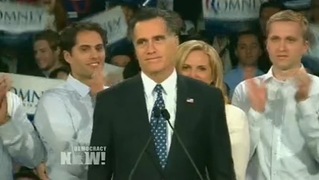
Topics
Guests
- Arnie Arnesenlongtime radio and TV host in New Hampshire. She was the Democratic nominee for governor in 1992.
- Arnie AlpertNew Hampshire program coordinator for the American Friends Service Committee since 1981. He has been active with Occupy New Hampshire.
Ahead of the Monday holiday celebrating Martin Luther King, Jr., we speak with two people key to establishing the day as a paid state holiday in New Hampshire—the last state to do so—replacing its optional Civil Rights Day in 1999. “I look at Mitt Romney talking about saving the soul of America and recall that the motto of the Southern Christian Leadership Conference was 'to redeem the soul of America,'” says Arnie Alpert, the New Hampshire program coordinator for the American Friends Service Committee since 1981 and activist with Occupy New Hampshire. “What we have to look forward to for Martin Luther King Day is to reconnect ourselves with values that tie together a message of peace, a message of social justice, a message of standing up forever against racism, and linking that together through social movements that take courageous, nonviolent action.” [includes rush transcript]
Transcript
AMY GOODMAN: I wanted to ask you, before we get to the end of this conversation, about something you both were very involved with. New Hampshire was one of the last states to have Martin Luther King Day.
ARNIE ALPERT: The last state.
AMY GOODMAN: I mean, Arizona voters approved Martin Luther King Day in 1992 after a tourist boycott. But in 1999, New Hampshire changed the name of Civil Rights Day to Martin Luther King Day. And as we move into Martin Luther King Day weekend and the honoring of Martin Luther King, in 1999, to be clear, New Hampshire became the last state to adopt MLK Day as a paid state holiday, replacing its optional Civil Rights Day. You both were involved in this longtime struggle. Explain. Arnie Arnesen, you were what? In the legislature? And—
ARNIE ARNESEN: I was in the legislature. It was 1985. I was a freshman legislator. It was my first floor fight, Amy, the first thing I did. I was this young woman. I had just given birth to a baby. You can actually see a film of me handing my four-month-old to the woman sitting next to me, as I am frightened and going down to the floor to fight for Martin Luther King Day. You need to know how many votes out of the 400 legislators we got. This is 1985. We got 60 votes for Martin Luther King Day, out of 400. Can you believe it? It was unbelievable. And I fought it every single year I was in. And it was—it pained me to see how long it took for us to actually embrace it.
AMY GOODMAN: And yet, you have Ron Paul right now, I mean, fiercely antiwar, expressing a lot of sentiment of so many people around the country, but also this issue of the Ron Paul Political Report, the Ron Paul Survival Report, the newsletters he put out that he claims were robo-signed, but talked about MLK Day as “Hate Whitey Day,” among other things. Arnie Alpert, can you talk about this?
ARNIE ALPERT: Well, I think you also want to look at Ron Paul, while he might have an antiwar message, he also wants to eviscerate the social safety net. So, and you have to look at what was Dr. King doing in 1968 at the time that he was killed? He was organizing the Poor People’s Campaign, and he was stepping up for the rights of black workers, poor workers in Memphis to be able to have a union. And I look at Mitt Romney talking about saving the soul of America and recall that the motto of the Southern Christian Leadership Conference was “to redeem the soul of America.” So we—what we have to look forward to for Martin Luther King Day is to reconnect ourselves with values that tie together a message of peace, a message of social justice, a message of standing up forever against racism, and linking that together through social movements that take courageous, nonviolent action.
AMY GOODMAN: Arnie Alpert and Arnie Arnesen, I want to thank you very much for being with us, as well as Dale Kuehne. That does it for our show. We head on to cover what’s happening in South Carolina and also to cover Martin Luther King weekend.












Media Options